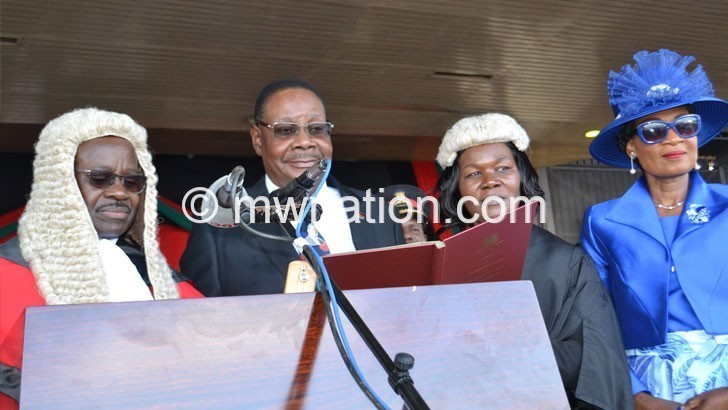APM faces legitimacy trial
President Peter Mutharika faces a legitimacy challenge after being rejected by a majority of voters from the Centre and North, according to political analysts.
If not well managed, the analysts warn, these 62 percent of voters could be a recipe for political tumults.

Only 38 percent of voters, mostly from the Southern Region, gave Mutharika a fresh mandate, narrowly defeating his main challenger Malawi Congress Party (MCP) torchbearer Lazarus Chakwera with 1 940 709 votes against 1 781 740.
University of Livingstonia political scientist George Phiri suggested in an interview that for Mutharika and his Democratic Progressive Party (DPP) to govern well, they must bury their pride and start mending fences by calling for a government of national unity.
Said Phiri: “Otherwise, with a 62 percent rejection rate, if he is not careful, his government may be stuck. He will have quite a challenge to legitimise his DPP government.”
Phiri observed that inclusive leadership is best demonstrated when put into practice for people to appreciate, adding that Mutharika should have invited his opponents to his swearing-in and inauguration ceremonies, where he should have asked them to work together.
“But instead of extending an olive branch to leaders of other parties, he is still proud to stand alone at these functions and call for peace and unity. One would wonder whether his call for unity is genuine or just lip-service,” he explained.
Governance and political commentator Martin Chiphwanya advised the President and his entire party leadership to propagate a message of unity and avoid uttering provocative statements that have the potential to fuel tension.
He also suggested that the President should rise above partisan elements and engage the opposition in constructive dialogue.
Chiphwanya added: “The President should show statesmanship by engaging his rivals and show his willingness to promote inclusivity.”
Mutharika amassed most votes from the Southern Region while performing poorly in the Central and Northern regions, where MCP and UTM candidates did better.
This is a repeat of the 2014 voting pattern when the North was for Joyce Banda, the Centre for Chakwera while the South was for Mutharika.
After the 2014 elections, Mutharika also formed a minority government as 64 percent of Malawians rebuffed him but he swiftly roped in United Democratic Front (UDF), which had 14 members of Parliament (MPs) in the 193-seat National Assembly. For five years, DPP and UDF were in a parliamentary working alliance.
Phiri also sees the DPP administration sailing through troubled waters in Parliament due to the numerical strength of a combined opposition bloc if they work as a united team.
As Parliament resumes in three weeks time beginning with swearing-in the 2019-2024 cohort of legislators on June 17 and 18, the DPP will have 62 seats in the House.
The opposition benches will collectively have 76 MPs comprising 55 from MCP, 10 for UDF, five for People’s Party (PP) with UTM and Alliance for Democracy (Aford) having four and one, respectively.
There are also 55 independent legislators although hours after his election, Samuel Chirwa of Mzimba Luwerezi declared his interest to work with and support DPP.
Phiri believes DPP’s destiny also lies in how opposition and independent MPs will strategise in the House.
“Unless DPP convinces independent MPs, policy direction in Parliament will be hard if the independents decide to remain autonomous because the DPP MPs will be outnumbered and that may be costly for them,” he argues..
However, in an interview DPP spokesperson Nicholas Dausi observed that Mutharika has already stated that the country now needs to look forward. “We can only do that by forgetting the past,” he said.
Several political and governance experts have argued that the country missed an opportunity to have a majority President after MPs rejected the 50 + 1 electoral system of voting which almost all Sadc (Southern Africa Development Community) countries use opting for a winner-takes-all system.





